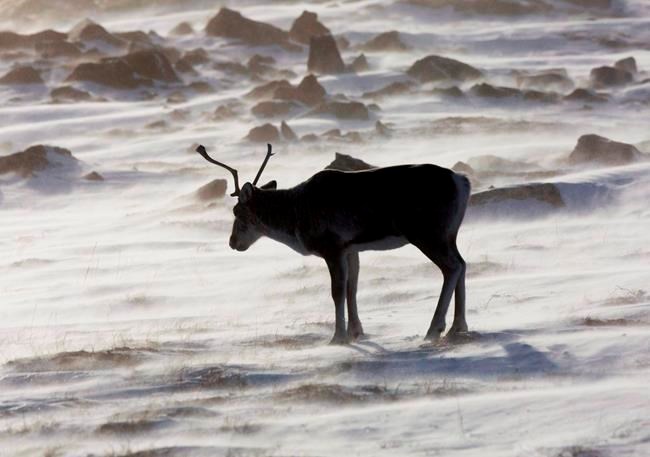MONTREAL — The Quebec government’s decision to fence in another endangered caribou herd and to kill any wolves that approach the animals is worrying environmentalists, who say the province is again delaying a long-promised plan to re-establish the species.
After putting a fence around the habitat of the seven animals that remain in a herd in Val d’Or, Que., the government says herds in the Charlevoix and Gaspé regions will be next to live behind enclosures.
The Wildlife Department confirmed that construction is underway to fence in the entire herd in Charlevoix, north of Quebec City, which is estimated at less than 20 animals. In Gaspé, the whole herd will not be enclosed but pregnant females will be captured and transported to fenced-in areas where they’ll give birth and raise their young for a few months before being released in the fall.
The government has also hired a trapping group, the Fédération des trappeurs gestionnaires du Québec, to “intensify” a program of trapping and killing wolves and other predators that threaten the caribou.
In an email, the Quebec government said these measures are considered temporary, adding they offer the best chance of ensuring the animals don’t die off in the short term.
“Enclosure helps protect caribou from predation and mortality, and they have access to ample quality food and water, all under the supervision of veterinarians,” spokeswoman Mila Roy said. Other measures to protect caribou, including preserving their habitat and dismantling forest roads, are already underway, she added.
Martin-Hugues St-Laurent, a biologist at Université du Québec à Rimouski, said enclosing animals and killing predators are the equivalent of a hospital putting a patient in intensive care in a last-ditch attempt to save them.
While such measures are sometimes appropriate, he said they mean little without meaningful action to protect the animals’ habitats.
“Putting the (animals) in enclosures to protect from predators without protecting the habitat is destined to fail,” he said in a recent interview. “It gives the impression we’re doing something, but we’re not doing anything efficient.”
St-Laurent said the reason there are too many predators is human interference.
He said caribou depend on thick, old-growth forests to shield them from predators and provide the lichen they eat. Over time, the logging industry has removed much of the old-growth and replaced it with younger trees. Logging and hunting roads provide convenient paths for wolves to access their prey, St-Laurent added.
Henri Jacob, the head of environmental advocacy group Action Boreale, said he believes Quebec has no intention of taking meaningful action to protect the caribou, pointing out that the government has failed to table its long-promised action plan to rebuild the species.
Instead, the government announced last week it was forming an “independent commission” that will hold consultations with stakeholders and citizens in regions where the caribou are found. The government said the commission’s report will be published in 2022 and the action plan will come into effect in 2023 — after the next provincial election. The government also announced that nearly 155,000 hectares were being protected from logging until 2028.
The committee is headed by Nancy Gélinas — an expert in forest economy -- but does not contain a caribou expert.
An environmental law group, the CQDE, said in a statement it was "extremely concerned" by the delay, which it described as "totally unjustified" given the urgency of the situation. The group said it was considering all options to protect the caribou and isn't ruling out legal action to push the federal government to step in.
Jacob said he believes that by pushing back its action plan, the government is hoping to “win time” until the smaller herds die off naturally. He said the government’s attempts at conservation, including closing some 160 kilometres of Quebec's thousands of kilometres of logging roads, fall far short of what is needed.
“The Quebec government is looking, in my opinion, for the answer they want, which is that it’s too late for the caribou,” he said in a recent interview.
Both Jacob and St-Laurent said no more time is needed to figure out how to save the caribou, which they describe as one of Canada’s most studied species. They said experts agree that what’s needed is the immediate closure of logging roads and the conservation and re-establishing of critical forests where the animals live. Jacob said adding new animals to some of the smaller herds, such as the Val d’Or and Charlevoix populations, could give them a better chance to survive.
The Quebec government, meanwhile, insists that it is committed to saving the caribou, and it said its commission is the right vehicle to create a “consensual and pragmatic plan” for the survival of the species.
St-Laurent said the struggle to save the caribou is a national one, adding that governments across Canada have found themselves “trapped" between saving caribou and realizing short-term economic gains through industries such as forestry.
Jacob puts it more succinctly: “When the two clash, caribou and forestry, it’s always the wild animal that disappears.”
This report by The Canadian Press was first published Nov. 13, 2021.
Morgan Lowrie, The Canadian Press




